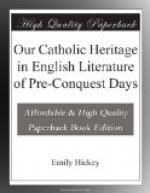“He that will have eternal riches, let him build the house of his mind on the footstone of lowliness; not on the highest hill where the raging wind of trouble blows, or the rain of measureless anxiety.”
“Power is never a good unless he be good who has it.”
Here is what he has to say of being well-born:
“Art thou more fair for other men’s fairness? A man will not be the better because he had a well-born father, if he himself is nought. The only thing which is good in noble descent is this, that it makes men ashamed of being worse than their elders, and strive to do better than they.”
And here is his standard of self-respect:
“We under-worth ourselves when we love that which is lower than ourselves."[D]
[Footnote D: Translation by Miss Kate Warren.]
These sayings are worth copying into a little book such as Alfred kept to note down things he wanted to keep track of. Asser tells us this, and he tells us of the “Handbook” which grew to a great size, from this collecting habit of Alfred’s. The book was unfortunately lost.
By no means have we exhausted the interest of Alfred’s story. It would be indeed difficult to do so; but we must now bid him good-bye.
We love to think how, amidst all his cares and work for his kingdom, he had the true Catholic Missionary spirit; for he sent embassies to India, with alms for “the Christians of St Thomas and St Bartholomew.”
There is a valuable thing which we possess, known as the “Alfred Jewel”: it has on it an inscription which we can truly say applies to far more than this work of art. Its application to Alfred’s work is indeed a very wide one:
Alfred commanded to make me.
CHAPTER VII
Some of greatest pre-Conquest poetry associated with name of Cynewulf. Guesses about him. Little known. Probably North-countryman, eighth century, an educated man. Finding of the Cross. Elene, story of St Helena’s mission. Constantine goes to fight invaders. Vision of the Cross. Victory. Journey of St Helena, and search for the Cross. The Finding.
We are going now to consider some of the greatest poetry written before the Conquest. It associates itself with the name of Cynewulf, a name with which certain poems are signed in runes. By-and-by we shall hear something about runes and the old writing; and something also about where our old treasures of literature, part of our dear Catholic heritage, are found in their original form.
As I have said, certain poems are signed with Cynewulf’s name; and there are others which are with more or less probability of rightness attributed to him on grounds of likeness of subject, likeness of style, similar greatness of treatment.




